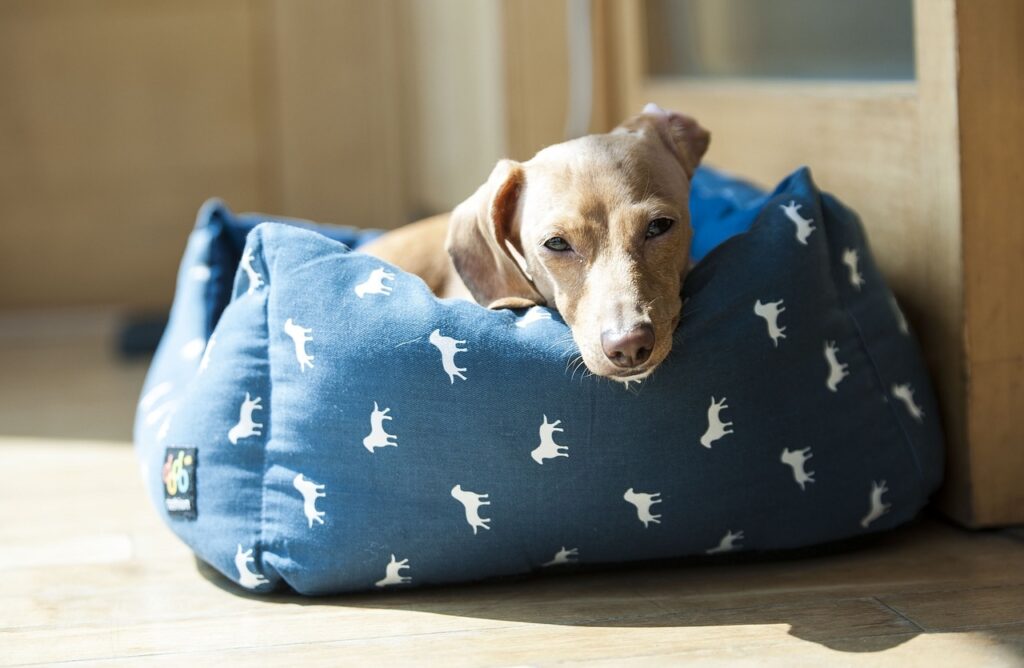We love our dogs but their destructive habits cause no end of frustration.
In the past, we’ve spent hours picking out the perfect bed for them: something comfortable, warm and soft. We buy the one at the top of our list and what happens? The bed gets destroyed by chewing, tugging, biting and scratching.
When you’re literally picking up the pieces of something you wanted them to appreciate and enjoy, it’s no fun.
Maybe you’re in a similar situation and have wondered aloud – why does my dog destroy his bed?
And it’s a good question.
We wanted to find out more about what drives such destructive behavior and to explore what can be done either to stop it happening altogether or to keep the destruction to a minimum.
Why do dogs mess up their beds?
Dogs destroy their beds for several reasons and it’s helpful to think about where some of this destructive behavior is coming from. It can be something relatively minor and easily trained out of your pet or there could be a bigger issue at play that takes more time and effort to eradicate.
Dogs who chew or scratch up beds may be responding to instinctual urges. To try and change that, you’re going to have to compete against tens of thousands of years of intuitive habit. Despite being domesticated, dogs are still very much tuned into their inner wild animal.
You might also have to think about your behavior and actions: are you doing anything that’s causing or contributing to the destruction?
New Teeth
Before we get into the main thrust of the post, it’s worth reminding some owners that if you have a puppy then it could just be that they’re teething.
As with humans, new teeth coming through can be uncomfortable and painful and chewing helps alleviate some of that. Your puppy may see the corner of its bed (especially if the material is plump and squashy) as a way of relieving the pressure in their mouth. By providing chew toys and items the dog is allowed to play with, it should take their attention away from their bed. The danger here could be that the puppy continues chewing the bed out of habit even after its teeth have come in, so that’s why we’d always try and distract them with chew toys.
Boredom
You’ve heard of the saying the devil makes work for idle hands, right? Well, the same applies to dogs with nothing suitable to play with. Dogs get bored just like humans do and when home alone and unsupervised they’ll make their fun. With no one around to stop them, this can spell disaster for soft furnishings and flooring.
A bored dog will see its bed as a fun chew toy. It will see something it can shake, scratch, chew and throw around. When you’re not around you should always make sure there’s a variety of toys and chew toys for your dog to play.
Toys should be more tempting than the comfortable bed that you want them to sleep on. You don’t have to leave them around the house all day long but they should be accessible when the dog is alone or when the destruction is most severe. Cuteness.com offers some really good advice when they suggest giving the dog a chew toy and praising them for using it but taking it away and withdrawing praise if the dog tries to play with it on their bed. This should help the dog learn that chewing on the bed is not allowed.
Boredom is one of the easier things to correct as it’s often just about adding stimulation to a dog’s day. It might take you a few tries to see what toys your pet prefers but there’s a lot of products on the market designed to keep your dog’s mind active when you’re in another part of the home or out completely. It helps, too, to think about the breed of dog you have and what that type is known for. Terriers, for example, like digging so is there a toy that indulges this urge safely?
Lack of Exercise
It could be that your dog isn’t getting enough exercise. New owners are often surprised to learn just how much effort it takes to tire certain breeds out.
If a dog has a lot of energy but nowhere to channel it, it can quickly become destructive in the home.
Find out the minimum recommended exercise time for the breed you have and work upwards from there.
We’re all caught up in the busy day-to-day reality of work schedules but we may need to make exercise a bigger priority for our pets. If you’re in a financial position to hire a dog walker when you’re out, then this can help. You could ask a friend or family member who’d be happy to do it for a small fee. Using your dog as a way to increase your fitness can be a great incentive, too, as long walks are also beneficial for human health and boredom!
Losing the Scent
If you regularly wash your dog’s bed, then you could be removing their scent from it. This often leads to vigorous scratching and circling which can damage bedding. As humans, we can easily forget how important smell is to our pets. It’s important to keep things clean but adding an old dog towel or a toy, something familiar smelling, may help calm the dog’s destructive tendencies.
Anxiety
Just like humans, dogs can feel stress and anxiety, too, and it can manifest as destructive behavior. It’s not always easily apparent as to what’s wrong but it can be a change in the environment or something that’s recently happened to the dog. For example, have you recently moved house, had a baby or added a new pet to the family? Have you remodeled part of the home? Has there been an emergency or disturbance? Did something happen on a walk or during a trip to the veterinarian? Dogs can be sensitive to their owner’s mood and react accordingly – are you stressed or anxious about something?
Separation anxiety
One of the biggest causes of anxiety in dogs is separation anxiety. If your dog is left alone in the house for prolonged periods, then they may be feeling insecure and upset at the lack of interaction. Sometimes, the separation may only be for a short period but some breeds are more prone to anxiety when left alone than others are. Changes in working patterns during and after the COVID-19 pandemic may have upset the schedule of the house. It’s a good idea to think about how long you’re leaving your dog alone during the day.
Dogs find comfort in chewing things and why wouldn’t they go after their bed if they’re anxious? It gives them an outlet for all that nervous energy whilst providing a sense of security. Destructive behaviour in this sense is usually because we’re not providing the interaction that the dog needs. It doesn’t make you a bad owner but it should give you a starting point for how to help fix the behavior.
Separation anxiety can also occur if something has happened recently that’s upset the natural order of things in the house. It could be that a favourite person has moved out or that there’s a change in schedule or home renovation. One of the things you can do is to give the dog something special but only when you’re not in the house.
This is suggested on the Pets WebMD website and we think it’s a great way to take the sting out of separation. They suggest a puzzle toy with peanut butter as a treat when the house is empty, and we’re definitely going to try it.
There are also dog calming sprays and diffusers you can use which should help reduce any anxiety whilst you’re out of the house.
You could also remove the bed when you’re not in the home and replace it with something more robust like an open crate with towels or even a laundry basket with blankets in just until the dog has broken out of the habit.
Hunting Practice
We mentioned how dogs still indulge their instincts earlier and it’s easy to see why they do destroy their beds: they’re killing prey. Most dog beds are soft and furry and whether your dog is bored or has an active imagination it’s no wonder the bed becomes a way of practicing that killing technique.
Attention Seeking
There’s also the possibility that your dog may be destroying his bed because he wants attention. It could mean that he needs more exercise or more general interaction. If there’s a new member in the house – animal or otherwise – he may feel left out. Dogs can be a lot like a human: no one likes to think they’re not getting their due when it comes to cuddles and attention.
How do I stop my dog destroying his bed?
We’ve included some pointers in the text above but here’s a quick recap of some of the things you can do as well as a few additional tips to help.
- You may need to update your dog’s collection of chew toys. Adding something fun, mentally challenging or physically soothing (lots of licking, etc) can divert a dog’s attention away from its bed. Giving them a special treat before you leave the house (and then taking it back when you get home) can create a powerful distraction from feelings of separation anxiety.
- Check that your dog is getting enough exercise. If it has too much pent-up energy, the behavior is unlikely to stop and may even escalate. You may need to introduce a second walk to your routine, go for longer trips out with your dog or think about employing a dog walker.
- Some beds are designed to withstand chewing and biting and some even have a money-back guarantee. This might be one avenue to consider if you’d like your dog to have a bed to sleep in.
- Some owners give up on an actual dog bed and choose to use a crate with towels and bedding inside or some cushions. This is cheaper and less likely to need replacing. It’s worth, too, looking for beds that don’t have zippers or embroidery as a dog may see opening them up as a game.
- Think about any recent environmental or personal changes in your life or the dog’s life.
- You can buy dog calming sprays, treats, collars and diffusers and some owners have had a lot of luck with these (others haven’t) so it may be worth a try.
- The dog may also be trying to put its scent onto new or a freshly washed bedding which could cause damage especially if the pet has sharp claws.
- If you have a puppy, then you may just have to wait for the adult teeth to come in.
- If you are at a genuine loss of what could be behind this behaviour, then it’s worth speaking to a veterinarian who may have further insight. It could be a physical issue that’s driving the destruction or a behavioral one that may need professional instruction.
- If your dog came from a shelter, it might be worth trying to find out more about the animal’s history as the behavior could be rooted in trauma or another specific experience.

